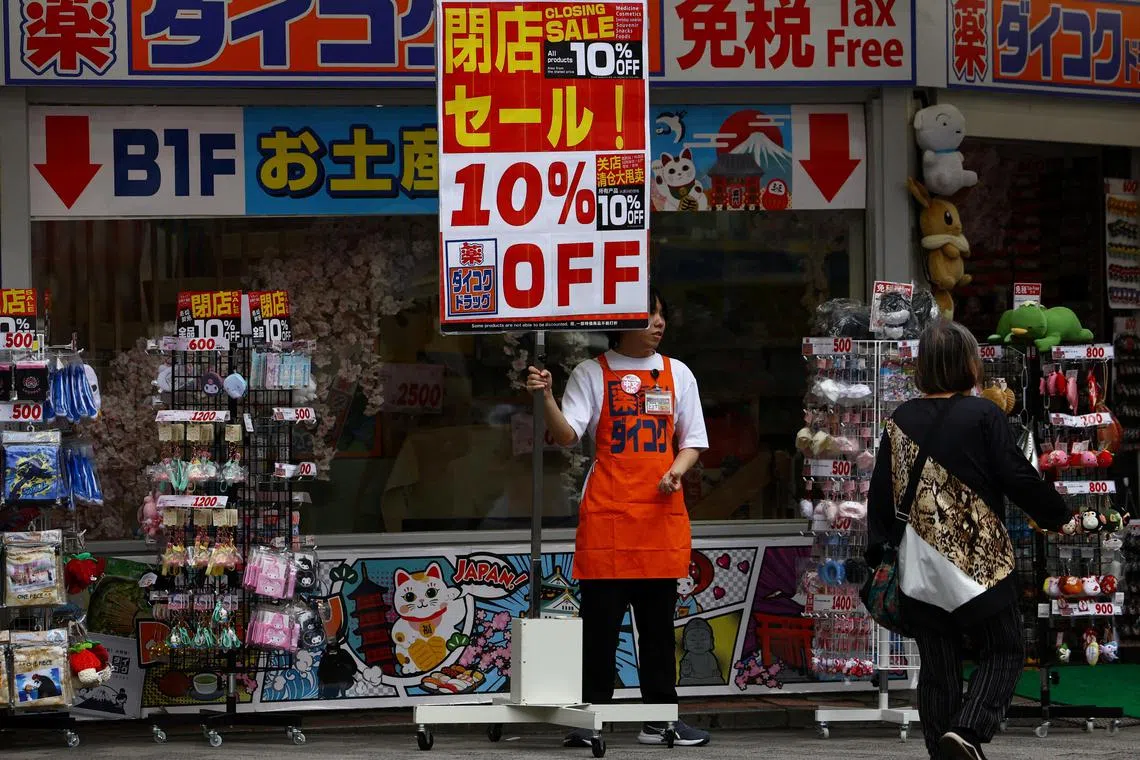Japan’s household spending falls in blow for shrinking economy
Sign up now: Get ST's newsletters delivered to your inbox

Domestic demand will likely be a key factor in determining whether Japan can avoid a technical recession after the economy shrank in the first quarter.
PHOTO: REUTERS
Japan’s household spending unexpectedly declined in April as elevated inflation deterred discretionary spending, in a worrisome sign for policymakers after the economy began contracting even before US tariff measures fully kicked in.
Outlays by households, adjusted for inflation, fell 0.1 per cent from a year earlier, the Ministry of Internal Affairs and Communications reported on June 6. The result was lower than the median economist estimate of a 1.5 per cent gain.
The decline was led by healthcare and miscellaneous spending, while outlays jumped 10.9 per cent for housing.
The importance of consumer spending as an engine of growth in Japan has increased as US President Donald Trump’s tariff campaign deals a blow to factory output and exports. Extra duties on steel and aluminium took effect in March, with tariffs on autos and a broad tax on other products starting in April.
Domestic demand will likely be a key factor in determining whether Japan can avoid a technical recession after the economy shrank in the first quarter.
“The elevated cost of living is weighing down on consumer spending,” said Mr Takeshi Minami, chief economist at Norinchukin Research Institute. “The price of essential items like food is rising so much that it makes households think twice about spending on other things.”
Data released in May showed that the country’s key inflation gauge accelerated in April to the fastest clip in more than two years, keeping price gains at or above the Bank of Japan’s (BOJ) 2 per cent target for more than three years.
An indicator of consumer confidence advanced in May, ending a five-month streak of declines, but still remains near the lowest level in two years.
Prime Minister Shigeru Ishiba is monitoring negative economic impacts from Mr Trump’s tariffs ahead of a key Upper House election likely to be held in July.
With his support ratings still languishing, Mr Ishiba’s government has attempted to reduce the price of rice – which has been soaring – by releasing emergency stockpiles into the market. He is also pursuing a trade deal with the US, as tariffs continue to hit Japan’s economy.
Economists surveyed by Bloomberg forecast the economy will grow by 0.2 per cent on an annualised basis this quarter after it contracted by 0.7 per cent in the January-March period.
BOJ governor Kazuo Ueda has also pledged to closely watch the strength in personal outlays while indicating a pause in the bank’s campaign to raise interest rates for now amid “extremely” high uncertainties. The BOJ is widely expected to hold when it next sets policy on June 17.
“Consumer spending is unlikely to help drive the economy when the impact of tariffs is expected to hit external demand,” said Norinchukin’s Mr Minami. “Today’s data shows that the BOJ doesn’t have to rush to raise rates. There’s no virtuous circle between wages and inflation. I expect the next hike will come around October.” BLOOMBERG


